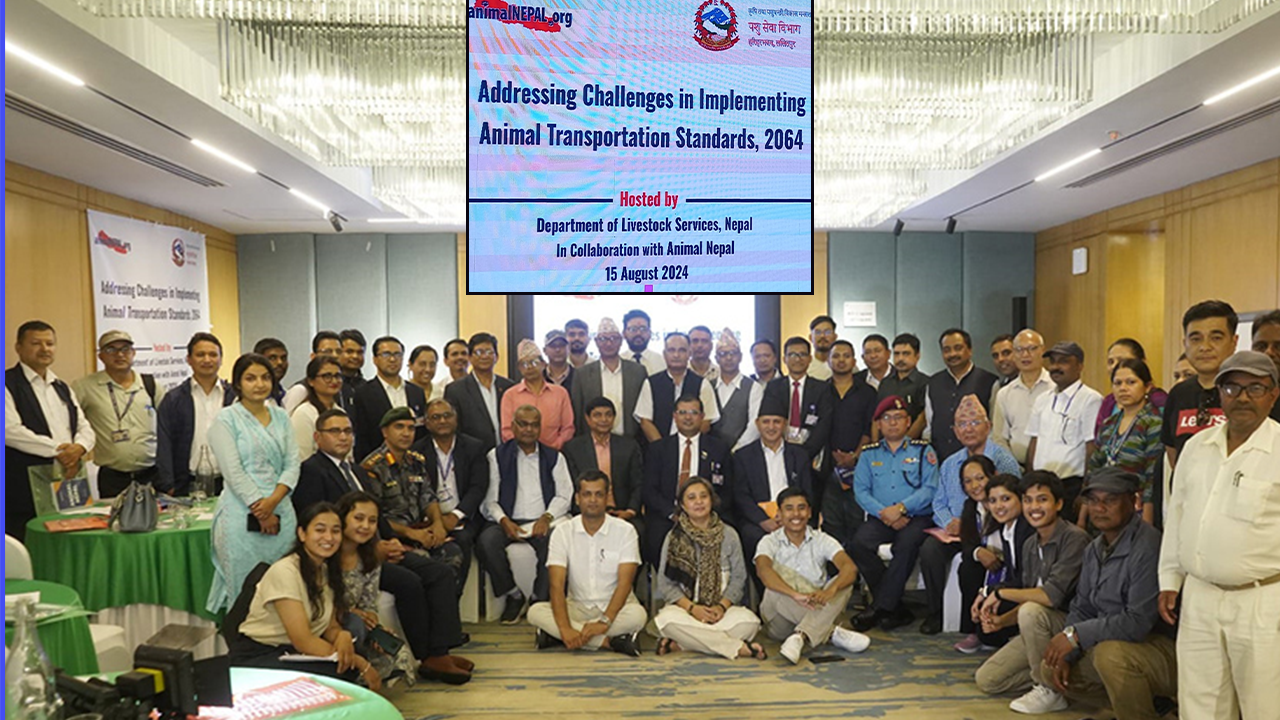
Kathmandu, Aug 15 (Keshav Bhattarai) : An interaction programme has been oraganised in Kathmandu on Thursday (15 August 2024) hosted by Department of Live Stock Services in collaboration with Animal Nepal. The agenda of the programme was ‘Addressing challenging in implementing Animal Transportation Standard, 2064’. The existing arrangements related to animal welfare in Nepal and their status were reviewed in program. The discussion program was organized in the presence of employees, veterinary doctors, stakeholders, livestock transport entrepreneurs, animal rights activists, officials of the ministry of agriculture and livestock, journalists, and staffs working in different quarantines across the country.
Even after 17 years have passed since Animal Transport Standard 2064 came into effect, stakeholders have expressed their concern in the programme that the transporters are not following it. Officials of the ‘Department of Animal Services’ said that the suggestions made in the discussion would be useful in formulating a policy for animal welfare addressing challanges.
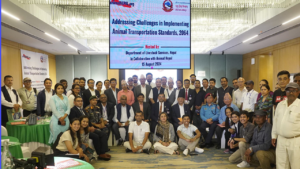
The chief guest of the program, Secretary at the Ministry of Agriculture and Livestock Development Rajendra Prasad Mishra, who was the chief guest, emphasized that there should be no delay in taking the animal welfare bill to the formal process. ‘If it is delayed, other works will also be stopped’, he said. Secretary Mishra focused on the standard and said, sometimes we make the standard high class and the system is weak. He focused on animal welfare, animal transport, social-economic development, infrastructure and economic status. He said that many works would have been done if the standards had been made keeping in view the condition of our roads, the ability of entrepreneurs to invest and the infrastructure. He said that it should be seen whether the Europeanf high class ‘Animal Transport Standard’ can fit in Nepal’s context or not.

Speaking at the event, Secretary Dr Mishra said that the draft of the Animal Welfare Act will be prepared in 6 months. He said that in recent times, rather than the need for animal welfare, the issue of implementation should be discussed.
Secretary Mishra said, “We are making rules and regulations above the global standard, but the institutional capacity, economic condition and infrastructure to implement are weak. He said that animal transport standards should be implemented by understanding the social environment, correcting the weaknesses and paying attention to the practical aspects. Overall, he claimed that good work has been started in the field of animal transportation and welfare.
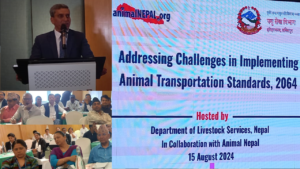
Special guest Dr.Braj kishor Prasad Shah, president of Nepal Veterenary Council said that the number of quarantines should not be increased for import and export regulation. He also emphasized the need for facilities and manpower in quarantine. He said that many problems related to transportation would be solved if the online monitoring of animal transportation system is developed.He said that the number of quarantines should not be increased for import and export regulation. He also emphasized the need for facilities and manpower in quarantine.
Three working/research papers were presented on the occasion. These working papers were prepared by the concerned officials with a lot of hard work. Deputy Director General of Department of Live Stock Services, Dr. Vinaya Kumar Karna, discussed on the subject’Animal Transportation Standard, 2064: Current status of its implementation and areas of improvement.’Through his working/research paper, he cleared about salient features of ATS/Animal Transportation Standard 2064. Likewise, he discussed about current status of enforcement of ATS,2064 enforcement and major constraint of effective enforcement of 2064. He talked on the issues like animal welfare-related provisions, supervision and monitoring etc.

According to Dr Karna, there are different achievements of ATS, 2064 enforcement. Systems of veterinary certifications in place, transportation of small animal through public vehicles greatly discouraged, establishment of inspection system, increasing of supporting hands, strong advocy, increasing general awareness among various stakeholders, employment generation, increasing network dimensions, increased entrepreneurship, strong presence of interest pressure groups, creation of legal platformsetc are the main achievement of achievements of ATS, 2064 enforcement. On the otherhand, lacking of cadre of quarantine inspectorate, tough budgetary provision, Non-compliance behavioral issues,informal movement and circulation of document inspection and system of traceability, certification mechanism credibility, unofficial interventions in monitoring and supervision by unauthorized groups and organizations,ill managed vertical, horizontal and diagonal co-ordination are the major constraints of effective enforcement of ATS, 2064 included in the working paper of Dr Karna. Revisiting and amendment in ATS 2064, develop boundary spanning leadership, identify stakeholders boundaries etc are ‘way forward’, according to Dr Karna.

Deputy Director General Dr.Karna said that the department is not the only one responsible for animal welfare, it is everyone’s responsibility. He said that the Animal Transport Standard 2064 addresses various topics such as the structure of the vehicle, the number of animals, the address of the transporter, the number and cost.
Dr Karna discussed well on ‘Animal Transportation Standard, 2064’connecting curerent status of its implementation and areas of improvement. Speaking after presenting working paper,Karna said that many good topics were covered in Standard 17 years ago.’It is well written on how to transport animals, but there are challenges in implementation due to various reasons’,he said.

Umesh Dahal, presented research/working paper on ‘Animal Welfare in Nepal: Legal Provisions, Status of Implementation and Way Forward.’ Dahal,in his working/research paper, explained the historical background related to animal welfare in Nepal, the prevailing laws related to animal welfare and animal welfare, the provisions made by the country’s act related to animal welfare, the provision of taking action against those who commit crimes against livestock in the country’s criminal code, and the status of law enforcement. During technical session Dahal presented scenerio on Present Situation of Animal Welfare in Nepal. He said after his working paper presentation,’efforts were being made to rewrite and finalize the animal service bill which has been pending at the ministry for a long time.’According to him, the laws related to animals are being amended with time. Stating that those indulging in illegal transactions would be fined, he said it was the responsibility of all to follow the law. He assured that the suggestions made in the discussion would be improved gradually.Stating that the department would be active for the implementation of the policies and regulations, he urged for everyone’s support and cooperation.

Programme head of Animal Nepal, Sulakshana Rana, gave presentation on ‘Navigating Obstacles: Addressing the challanges Faced in Advancing Animal welfare Standard’.Rana cleared about the animal transportation standard, overview of animal transportation challanges comprising overload trucks and animal distress,extended travel times without rest or food,and lack of enforcement of standards. likewise program head rana discussed about kry provision and challanges in implementing human animal transportation standards,challanges urgrnt issues and obstacles as veterinary certification challanges and veterinary checks, road condition and connectivity, non-compliance risk, enforcement and moneitoring challanges, legislative and policy gap etc. Next, Rana cleared about ethical consideration and infrastructure deficiencies affecting animal welfare too. At last, She emphasized on “urgrnt need for compliance with animal transportation standard through strengthened collaboration, continuous improvementand achieving nationwide compliance with the animal transportation standard 2064, as model for ethical and humane animal treatment in Nepal” as a path forward for animal welfare.
Animal Nepal, which has been working in favor of animals for a long time, has expressed dissatisfaction with the activity of transporting animals, saying that the issue of animal welfare has been overshadowed. program co-ordinator,Rana appealed to the stakeholders to ensure the right of every living creature to live freely.
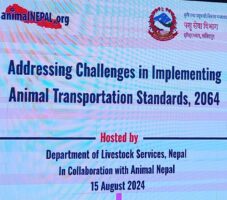
Speaking on the occasion, programme head of Animal Nepal Rana said that the drivers are being counselled in terms of awareness. Animal Nepal has emphasized on the use of ropes that do not affect during transportation of animals in trucks. Rana informed in the program that various items were used to ensure that animals do not get hurt during transportation. She said that there was some problems in the trucks transporting animals from Janakpur and Lumbini to Kathmandu. Program head Rana said, it would be effective if everyone works together. She thanked the Department of Animal Services, various associations and offices for their cooperation.
Senior Superintendent of Police at the Police Headquarters, Chandra Dev Rai, said that the suggestions given to the police regarding the transportation of animals in the workshop would be very useful. He urged the businessmen to carry the documents they need in their hands. He said that the feedback given by the participants of the program would be kept with the departmental chief.
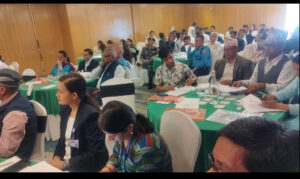
Similarly, Senior Superintendent of Armed Police At the APF Headquarters, Shankar Khanal, said that the interaction program has given a lot of alerts for working in the field. Stating that alerting the police was the right thing he said,’whether we have sensitized the truck drivers, helpers and businessmen who are transporting, it is an import thing.’ He said that the suggestions raised in the discussion would be conveyed to different districts as well.’if attention was not taken in the transportation of animals, then the welfare of animals would not be possible and human health would also be affected, he clarified in the program.
Special Guest, Mr Devendra Prasad Yadav, President, Animal Health and Livestock Professional Council, emphasized the need for the department of animal service, police, various organizations related to animal welfare, quarantine offices and other stakeholders to go for coordination approach to implement the ‘Animal Transport Act’.Yadav emphasized the need for all stakeholders to be sensitive while transporting animals to destinations. Stating that animals should not be treated cruelly, he said that there should be no nasal wounds during the transportation of animals.
Next,it was discussed on issues faced being in the live animal transportation business with representatives from transportation association. It was performed interaction/ discussion amidst at program focusing on identifying specific challanges faced by transporters, government agencies,and animal welfare organization in implementing the transportation standard. Likewise there was discussion on constraints related to terrain,vehicles limitations, and enforcement capacities. On the otherhand, it was discussed in deeply way on exploring opportunities for collaboratives efforts to address implemnentations challanges.

In the program, the participants shared the problems and challenges faced by them while working. Suggestions were made to solve similar problems. Most of the participants of the program appreciated the policy related to ‘animal transport standards’.The participants of program questioned why the Supreme Court had ordered the department to make a law and why it was delayed. Similarly, the participants complained that the practice of releasing those transporting against the standard by paying Rs 5,000 again and again was not right.
President of Nepal Veterinary Association Dr Ram Krishna Khatiwada said that poultry certificates have been found bundled in bundles and are still found anywhere these days. He said that the Veterinary Council has taken ruthless action against those who do such acts against the standards. Khatiwada claimed that it was not necessary to keep many quarantines in the check post. He clarified that if the animals to be carried are not transported according to the standards, they will be eagles and action should be arranged.
Dambar Bahadur Bam, an office-bearer of the Veterinary and Livestock Stock Association, said that it would not be acceptable to all if the Department of Animal Services issued a circular as the local, provincial and federal governments have their own policies. He said that the bill made in 2064 BS has been stalled at the Ministry of Agriculture and Livestock. ‘Why has the bill not been implemented yet?’, He asked.
Businessman Dil Bahadur Lama stated the need for reforming the legal aspects in a way that would benefit the businessmen. He said that although the points of the current anenium are strong, the transport entrepreneurs are facing problems from various points of view.
Animal Husbandry Entrepreneurs Association member,Sijan Khadgi urged Animal Nepal to provide training to the workers in the field of animal welfare. He said that if the internal and main roads of the country are improved, the animals can be easily transported to the destination by vehicles.
Dillinath Poudel, who participated in the interaction program, claimed that there was no weakness in the transport standard policy but the implementation aspect has been diluted.He demanded that consumers should be allowed to consume clean meat. Although it is a healthy animal, it is unhealthy when it arrives in Kathmandu, so meat is also unhealthy, he argued.

Sharmila Gautam, chief of The Central Fisheries Promotion and Conservation Centre, Balaju, said that domestic and wild animals have been included in the animal transport standards, but fish have not been included.
Pawan Acharya, a goat trader, said that VTRS is being demanded at checkpoints like in the transportation of other animals. He urged the authorities concerned to fix vehicles transporting animals. Deepa KC, who is associated with Animal Nepal, asked why the bill of the transport vehicle would not be booked.
Dr.Modnath Gautam, working at the Animal Quarantine Office, Kathmandu, said that the three working papers were effective, but it would have been better if the special work done by the quarantine offices had been included. He disagreed with the complaint that quarantines did not work for 17 years. He claimed that the quarantine workers were working day and night. In the last fiscal year alone, a fine of Rs 110,700 was imposed on vehicles transported in Ramnagar and Nagdhunga as per the law. He informed that action was taken against 22 vehicles in Ramnagar and 20 vehicles in Nagdhunga in the month of Asadh alone. He said he had collected Rs 40,000 revenue from Ramnagar. A revenue of Rs 22,500 has been collected from Nagdhunga. Gautam claimed that this work was successful with the help of security personnel. Why only Rs 5,000 penalty again and again ? In this regard, he said that proper laws are needed to prevent this from happening. He said that formalin tests are being done at the posts while transporting. Stating that the quarantine workers are aware of the health list, he said that three dead buffaloes were found in Ramnagar in Asadh. Gautam believes that action is not the only solution.
NASA President Dr Loknath Poudel lauded the work done by the Department of Animal Services so far. He said that it would be better to take the certificate given by the veterinary doctor to the online system.Some of the speakers said that such interactive programs should be launched to the people’s level. They also said that even after the construction of the slaughterhouse, animal rights will be solved by 75 percent.
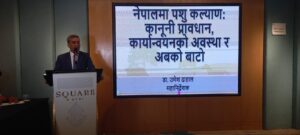
On the occasion, officials of the Department of Animal Services said that they were moving ahead to organize the veterinary certificates and assign a special scope.It was informed in the program that the Department of Animal Services should end the practice of certification from anywhere.The Animal Welfare Bill is also in the process of moving forward.The department has made institutional preparations for all the works.According to senior officials of the Department,special priority will be given to the suggestions discussed institutionally and individually on the issues related to animal transportation standards and animal welfare.
The officials of the Department of Animal Services are also making efforts on how to organize the veterinary certificate under the transportation standard and determine the special scope. The Ministry and the Department of Animal Services are also trying to end the practice of certification from anywhere. Work has already been done with a new structure for animal welfare. The Department of Animal Services is going to move ahead with a new way to organize cattle slaughterhouses at the local level as well.
At last the discussion of the program was concluded well. All of the participants of the programme suggested well on the agenda’Addressing challenging in implementing Animal Transport Standard.The Official of Ministry and department directed to different quarantine staffs to work effectively for animal welfare aspects.
At the end of event, Sulakshana Rana, program head of Animal Nepal, Mr Jeevan Khatiwoda of Chaupaya Bewasayee Sewa Sangh, Dr Samjhana Kumari Kafle, joint secretary, Ministry of Agriculture and Live Stock Development, Dr Devendra Prasad Yadav, President, Animal Health and Live Stock Professional Council, Dr BKP Shah , president of Nepal vetenery council, Dr Umesh Dahal, Director General of Department of Live Stock Services etc gave closing remarks. The programme was announced by Dr Nawaraj Shrestha, Senior Veterinary Officer, DLS .
Comments